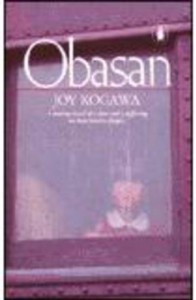O! what Man will do fore a Rime!
Self-proclaimed bibliophile, culture nut and nerdfighter. English lit. and linguistics geek. Future career in publishing.
Obasan by Joy Kogawa

March 3, 1942
Dear Wes:
This is just to warn you: Don't you dare come back to B.C., no matter what happens, what reports you read in the papers, whatever details I tell you in letters. You stay out of this province. B.C. is hell.
- Muriel Kitagawa
Excerpts from This Is My Own
"Letters to Wes"
Obasan is about a Japanese-Canadian woman who goes to visit her aunt ("obasan") after her uncle's death. While visiting, she discovers old files and records her other aunt left that detail the Japanese internment camp situation and her aunt's fight to get these injustices recognized and recompensed. As she spends more time at her aunt's home and reads over these files, she begins to relive her childhood as a Sansei (third-generation Japanese immigrant) in Vancouver and the dispossession and displacement of her family in the internment camps and labour camps after the bombing of Pearl Harbour.
The novel chronicles this woman's journey from idyllic childhood surrounded by people who love her to a family torn apart and shipped off to different parts of the province in a governmental attempt to get Canadians of Japanese ethnicity to repatriate back to Japan. It's a very sad part of Canada's history, and I think Kogawa handles the subject with the depth and humanity it deserves.
Kogawa has great technical skill: her prose is lyrical, her diction is perfectly chosen and she can weave a story through multiple styles (epistolary in the form of letters, a political memorandum, song and childhood reminiscences) with surprising clarity. Although the plot itself is a bit convoluted since we are following Naomi, our protagonist, through a journey of her own self-realization about the entire affair and her childhood growing up in these camps and ghost towns. However, Kogawa brings a certain humanity to all aspects, focusing of course on the Japanese-Canadians and the injustices dealt them. There is also a solemn strength in Naomi's character as she wades through these hardships and the new information that is brought to light as she reads the documents.
Part autobiographical (Kogawa was one of the Japanese-Canadian children to be placed in an internment camp in the BC interior and her real life displacement follows Naomi's) and drawing from Muriel Kitagawa's historical letters about the dispossession of Japanese-Canadian property, jobs and way of life and racist, fear-mongering legislature passed in the wake of Pearl Harbour, Obasan is both informative and personal. Kogawa never makes us feel like this story is solely about Naomi and neither does she make us feel like every child had Naomi's story; however, she forces us to look at the situation and realize the terrible effects it had on the Japanese-Canadians who truly believed in the Canadian government and were subsequently disillusioned. It's heartbreaking to watch as these people are stripped of everything except the clothes on their backs and their little trinkets and shipped off because no one wants them. It's even more distressing when we take into account that families were torn apart and many never saw each other again -- sometimes not even knowing if the others were alive or dead.
Rife with symbolism, especially about oppressive and racist white governments versus minorities (specifically Asian) in the mid-20th century, this novel really captures the heart of the tragedy (both the internment camps and the atomic bombs) that befell the Pacific Ocean side of World War II. A very moving portrayal and one I highly recommend.









